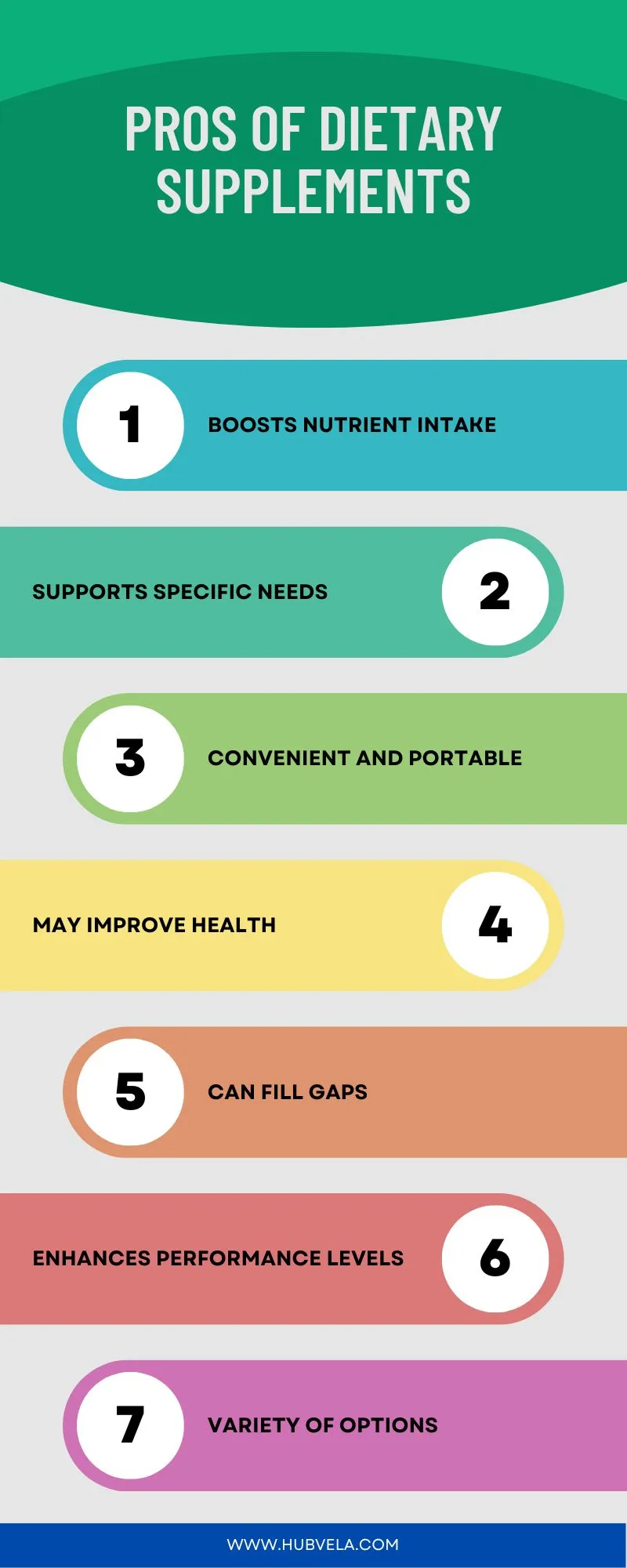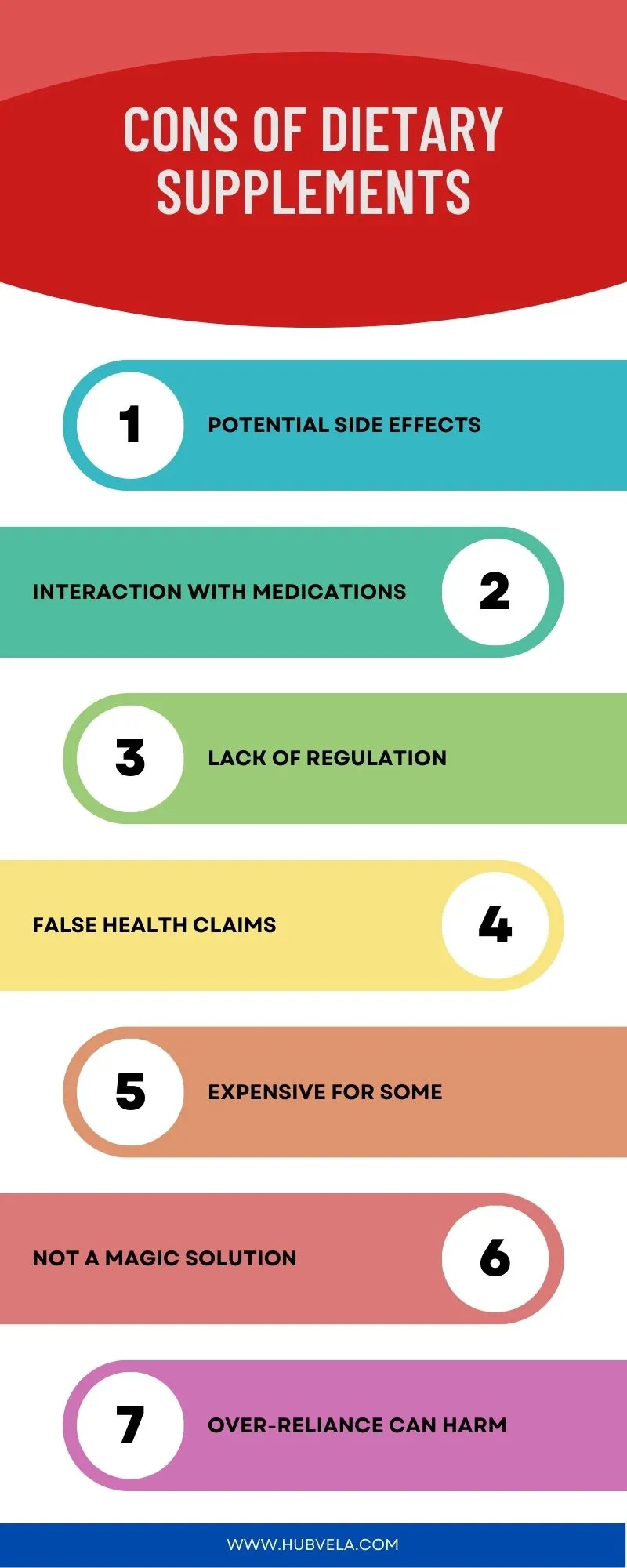In today’s fast-paced world, where health consciousness is at an all-time high, dietary supplements have become a popular choice for individuals seeking to optimize their nutrition or address specific health concerns.
However, like any double-edged sword, these products offer both benefits and potential drawbacks that warrant careful consideration before incorporating them into one’s daily routine.
In this article we will explore the pros and cons of dietary supplements, shedding light on this complex issue and providing valuable insights for consumers looking to make informed decisions about their health.

--Advertisement--
Pros of Dietary Supplements
Dietary supplements have become an increasingly popular choice for individuals seeking to optimize their health and well-being.
These concentrated formulas offer a variety of essential nutrients that may not be obtained in sufficient quantities through diet alone.
We will explore the pros of incorporating dietary supplements into your daily routine, highlighting the numerous benefits they can provide.

1. Boosts Nutrient Intake
By taking dietary supplements, you can effectively increase your daily intake of essential nutrients. Sometimes it’s challenging to get all the necessary vitamins and minerals from food alone, especially with busy schedules or specific dietary restrictions.
Supplements offer a convenient way to fill those gaps and ensure you meet your daily nutrient requirements. They can provide a concentrated source of key nutrients like vitamin D, calcium, iron, or omega-3 fatty acids, which might be lacking in your diet.
This boost in nutrient intake can help support overall health and well-being by promoting proper functioning of various bodily systems.
However, it’s essential to choose supplements wisely and consult with a healthcare provider to determine your specific needs and avoid potential risks.
2. Supports Specific Needs
Supplements cater to individual requirements, offering targeted support for specific needs. Whether you have a vitamin deficiency, struggle with low energy levels, or need extra support for your immune system, dietary supplements can provide the necessary nutrients to address these specific concerns.
For example, if you have low iron levels, an iron supplement can help boost your iron intake and improve your energy levels. Similarly, if you’re looking to support your bone health, calcium and vitamin D supplements can be beneficial.
3. Convenient and Portable
Dietary supplements offer a convenient and portable way to enhance your nutrition and health. Whether you’re on the go, traveling, or at work, supplements provide an easy option to ensure you meet your daily nutrient requirements.
Instead of carrying around multiple bulky food items, you can simply take a few supplement capsules or tablets with you wherever you go. This convenience makes it easier to stick to your health goals even in the busiest of schedules.
The portability of dietary supplements allows you to maintain a consistent intake of essential vitamins and minerals, which is especially beneficial for individuals with hectic lifestyles.
Embracing the convenience of dietary supplements can help you stay on track with your nutritional needs effortlessly.
4. May Improve Health
Considering the potential benefits they offer, incorporating dietary supplements into your routine may contribute to improving your overall health.
Supplements like vitamin D can help strengthen your bones and immune system, while omega-3 fatty acids support heart health. Furthermore, certain supplements contain antioxidants that protect your cells from damage and reduce inflammation.
By filling potential nutrient gaps in your diet, supplements can enhance your energy levels and cognitive function. Specific supplements like probiotics promote good gut health and aid in digestion.
It’s essential to choose high-quality supplements and consult with a healthcare provider to ensure they align with your individual needs and health goals. Integrating dietary supplements wisely may help you optimize your well-being.
5. Can Fill Gaps
Filling nutrient gaps in your diet with supplements can significantly enhance your overall health and well-being. Sometimes, it can be challenging to obtain all the necessary vitamins and minerals solely from food.
Dietary supplements offer a convenient way to ensure you’re meeting your daily requirements, especially when certain nutrients are lacking in your meals.
For example, if you don’t consume enough dairy, a calcium supplement can help maintain strong bones. Fr individuals with limited sun exposure, vitamin D supplements can support optimal bone health.
6. Enhances Performance Levels
To optimize your physical performance and achieve your fitness goals, incorporating dietary supplements can provide a valuable boost in enhancing your overall energy levels and endurance.
Supplements like creatine, caffeine, and beta-alanine have been shown to improve exercise performance, increase strength, and delay muscle fatigue.
Creatine, for instance, aids in producing energy during intense workouts, allowing you to push harder and recover faster. Caffeine can enhance focus and endurance, making your workouts more productive.
Beta-alanine helps buffer lactic acid build-up in muscles, reducing fatigue and boosting performance during high-intensity activities.
7. Variety of Options
With a plethora of options available in the market, dietary supplements offer a diverse range of choices to cater to your specific health and fitness needs.
Whether you’re looking to boost your immune system, improve joint health, enhance muscle recovery, or increase energy levels, there’s a supplement tailored to address your individual requirements.
From vitamin and mineral supplements to protein powders, probiotics, and herbal extracts, the variety of options ensures that you can find a product that aligns with your goals and preferences.
This wide selection allows you to experiment with different supplements to determine which ones work best for you, helping you optimize your overall well-being and performance.
The abundance of choices in the supplement market empowers you to take control of your health journey effectively.
Cons of Dietary Supplements
Dietary supplements have become increasingly popular in recent years, with many people turning to them as a way to improve their health and well-being.
While there are certainly benefits to taking supplements, it’s important to be aware of the potential drawbacks as well. We’ll explore some of the cons of dietary supplements.
By understanding these potential downsides, you can make informed decisions about whether or not dietary supplements are right for you.

1. Potential Side Effects
Be cautious of the potential side effects that dietary supplements can cause. While supplements aim to boost your health, they may lead to adverse reactions if not taken carefully.
Some common side effects include digestive issues like nausea, diarrhea, or constipation. Certain supplements can also interact with medications or exacerbate existing health conditions.
It’s crucial to consult with a healthcare provider before incorporating supplements into your routine, especially if you have underlying health concerns.
Overconsumption of certain vitamins or minerals can result in toxicity, leading to symptoms such as fatigue, dizziness, or organ damage.
Remember, more doesn’t always mean better when it comes to dietary supplements. Prioritize moderation and informed decision-making to minimize the risk of potential side effects.
2. Interaction With Medications
While dietary supplements aim to boost your health, it’s important to be aware of their potential cons, such as interactions with medications.
Certain supplements can interfere with the effectiveness of medications you may be taking for various health conditions.
For example, supplements like St. John’s Wort can reduce the effectiveness of birth control pills or medications used to manage conditions like depression.
Some dietary supplements can increase the risk of bleeding if taken with blood-thinning medications like warfarin. It’s crucial to inform your healthcare provider about all the supplements you’re taking to avoid any harmful interactions with your medications.
Always consult with a healthcare professional before adding any new supplements to your routine to ensure your safety and well-being.
3. Lack of Regulation
The lack of regulation in the dietary supplement industry poses significant risks to consumers’ health and safety. Unlike prescription drugs, dietary supplements don’t have to undergo rigorous testing by the Food and Drug Administration (FDA) before being marketed to the public.
This lack of oversight means that the quality and safety of dietary supplements can vary widely between brands and products. Without proper regulation, there’s a higher chance of contamination, inaccurate labeling, and even the presence of harmful ingredients in these supplements.
This lack of consistency and transparency makes it difficult for consumers to make informed choices about the supplements they’re taking, potentially putting their health at risk. It’s essential to be cautious and do thorough research before incorporating any dietary supplements into your routine.
4. False Health Claims
Consumers must be wary of false health claims made by manufacturers of dietary supplements, as these claims can be misleading and potentially harmful.
Many supplement companies exaggerate the benefits of their products without sufficient scientific evidence to back up their claims.
False promises such as ‘miraculous weight loss’ or ‘cure for all ailments’ are often used to lure unsuspecting consumers into purchasing these supplements.
Relying on such misleading information may lead individuals to neglect proven medical treatments or to exceed safe dosages, resulting in adverse health effects.
It’s essential to critically evaluate the validity of health claims associated with dietary supplements and consult healthcare professionals before incorporating them into your daily routine.
5. Expensive for Some
Considering the cost factor, incorporating dietary supplements into your routine may prove to be financially burdensome for some individuals.
The prices of dietary supplements can vary widely, with some being quite expensive, especially if you opt for high-quality or specialized products.
For individuals on a tight budget, the regular purchase of supplements can strain finances and may not be sustainable in the long run. Moreover, health insurance plans often don’t cover the cost of these supplements, adding to the financial burden.
This can lead to a situation where individuals may have to choose between buying essential groceries or investing in dietary supplements, making it challenging to prioritize their health needs over other basic necessities.
6. Not a Magic Solution
While dietary supplements may offer certain benefits, it’s important to recognize that they aren’t a magical solution to all health concerns. Supplements are meant to complement a healthy lifestyle and balanced diet, not to replace them entirely.
Relying solely on supplements can lead to neglecting essential nutrients obtained from whole foods. Taking excessive amounts of certain supplements can have adverse effects on your health.
It’s crucial to remember that supplements aren’t regulated as strictly as medications, so their safety and effectiveness can vary.
They shouldn’t be viewed as a quick fix for health issues but rather as a support to an already well-rounded approach to wellness. Always consult with a healthcare professional before starting any new supplement regimen.
7. Over-Reliance Can Harm
It’s important to be cautious of over-relying on dietary supplements, as excessive intake can potentially harm your health instead of improving it.
While supplements can be beneficial when used appropriately, consuming high doses or relying solely on them for nutrition may lead to adverse effects.
Overloading your body with certain vitamins, minerals, or herbal extracts beyond recommended levels can cause toxicity, resulting in symptoms like nausea, headaches, or even more severe health issues.
Excessive reliance on supplements might lead to neglecting the importance of a balanced diet, which provides essential nutrients in their natural form.
Conclusion on Pros and Cons of Dietary Supplements
Overall, dietary supplements can provide added nutrients and health benefits for individuals who may have deficiencies or specific health concerns.
However, it’s important to be cautious and consult with a healthcare professional before adding any supplements to your routine, as they can have potential risks and side effects.
It’s always best to focus on a balanced diet and lifestyle to meet your nutritional needs whenever possible.


